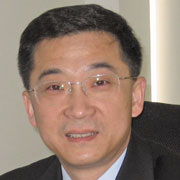Ming-Qiang Zhang talks about affordable medicines, nano vacuum cleaners and the new RSC journal MedChemComm. Interview by Holly Sheahan in Brussels.
One of the reasons why there are so many hepatitis B patients is because a full course of treatment is very expensive. But as the disease is so prevalent, employers ask for a medical check before hiring someone. So people buy just enough drugs so that they pass the medical check, but then stop taking them because they cannot afford to keep up the treatment. This has lead to the spread of a lot of drug-resistant strains of the disease. Not many companies are doing much research into hepatitis B drugs, especially in the west, so I think it’s important to do the research in China where a lot of the patients are and it is very important to make sure the drugs are affordable for everyone.
What research achievement are you most proud of?
The thing I am most proud of as a medicinal chemist is a project where we discovered an agent, called sugammadex, that would help the recovery of muscle function after surgery. Very often anesthetists give muscle relaxants to prepare patients for surgery, but after surgery you want the muscle function of the patients to return. Partly because many surgical procedures are done in one day without keeping the patient in. So it is important that the patient can leave and get on with their recovery. But also because the relaxant affects not only skeletal muscle but also muscles in the lungs and heart.
Before sugammadex, all the drugs used in clinics to recover muscle function were inhibitors of the enzyme acetylcholinesterase. The inhibition acts as a mechanism to increase the level of acetylcholine, which helps to recover muscle function but also leads to cardiovascular side effects. To protect the heart you also have to give the patients atropine, which in itself has other side effects.
The team that I was working with in Organon in the UK came up with the idea that instead of competing with the muscle relaxants at the receptors in order to increase acetylcholine levels and messing up the homeostasis balance, we could develop a ‘nano vacuum cleaner’ that will go into the system and suck up the drug once it has done its job and remove it from the body. That was a completely new concept and the chemistry was very difficult but we managed it using a class of cyclic sugars. Now the drug is marketed in Europe and is being used to help people.
I think the same principle could be used for a lot of different medical problems. Many medical cases in clinical practice are due to the side effects caused by overdosing, so a nano vacuum cleaner for all medicines would allow doctors to control their effect and control the drug more closely.
You recently moved to Shanghai from the UK to work for Roche R&D Centre. Tell me about your current role.
My current role is as the chief technology officer and vice president of external research, so it is a research role. We want to find technology that is useful in our drug discovery efforts. This might be in an academic institute or in a small company so we can either collaborate or license them. Our effort is focused on bringing together a diversity of research approaches to a project, but also trying to do drug discovery more quickly by leveraging external resources.
What is the secret to having a successful research group?
I would say team work, and what I think of as the 4 C’s. These are having a common goal, commitment, creativity and communication.
You are on the MedChemComm board, a new journal from the RSC, are you excited about this?
Although medicinal chemistry is a UK strength and pharmaceutical R&D is one of the greatest assets the UK has, it isn’t common to have a dedicated medicinal chemistry course in UK universities. So I think the creation of MedChemComm is a very good idea. There are lots of medicinal chemists out there, with many in industry and pharmacy departments and it is great to give these chemists somewhere to publish.
You went to the University of Antwerp, based here in Belgium, is it nice to be back?
It is very interesting to come back! I was based here for three and a half years doing my PhD in medicinal chemistry. For me, coming to Europe was very exciting, I got a scholarship from the Chinese Ministry of Education, and I very much enjoyed living here.
If you weren’t a scientist what would you be?
After graduation of high school, I worked as a farmer for a while in the countryside, and the teacher in the village I was staying in could not work for some reason. As I was well educated, I was asked to step in. I was only 17 but I really enjoyed it, so perhaps I would have been a teacher.











